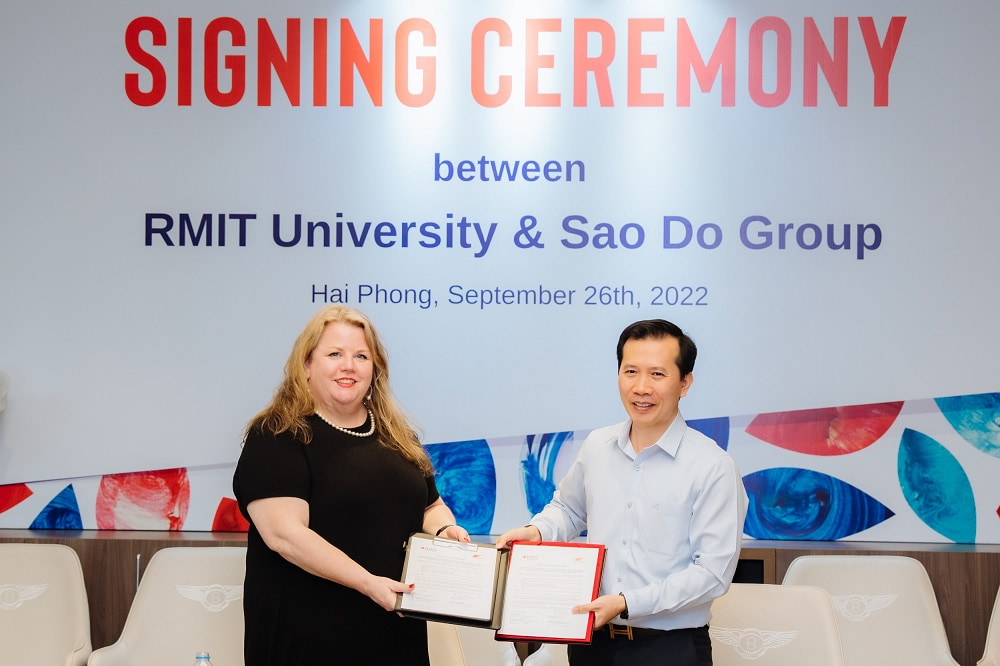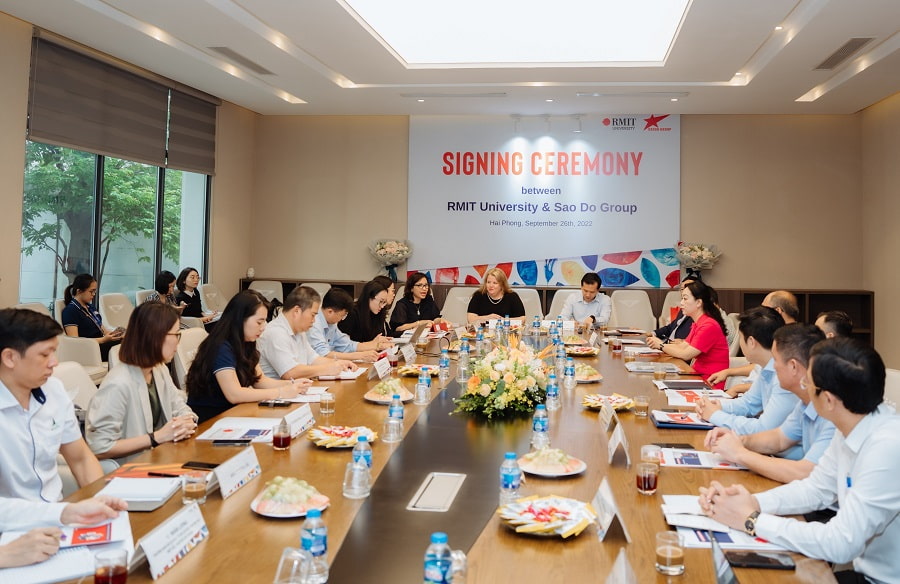
RMIT University and Sao Do Group to strengthen cooperation
RMIT University and Sao Do Group have signed a memorandum of understanding (MoU) to mark their cooperation in skills training and research to cultivate high quality workforce in Vietnam.
The MoU will see RMIT University and Sao Do Group collaborate on a pilot skills training program for workers in the logistics and supply chain sector. This pilot program offers a variety of courses that meet international standards, focusing on upskilling and reskilling new employees and middle management of enterprises within Sao Do’s Nam Dinh Vu Industrial Park.
The collaboration receives support from the Hai Phong City’s leaders, Hai Phong Economic Zone Authority, as well as logistics enterprises and associations.
 Ms Mish Eastman, RMIT Deputy Vice-Chancellor (Vocational Education) and Vice-president (pictured-left) and Mr Nguyen Thanh Phuong, General Director of Sao Do Group (pictured right) signed the memorandum of understanding.
Ms Mish Eastman, RMIT Deputy Vice-Chancellor (Vocational Education) and Vice-president (pictured-left) and Mr Nguyen Thanh Phuong, General Director of Sao Do Group (pictured right) signed the memorandum of understanding.
The Fourth Industrial Revolution's far-reaching impact along with the effects of the COVID-19 pandemic have heightened the need for high-quality workforce in Vietnam more than ever.
Yet there are certain challenges in skills training: Many existing training programs do not meet industry needs in terms of quantity and quality. There is limited skills training dedicated to developing high-quality human talent that meet international standards. And workers lack lifelong learning roadmaps and formal recognition of skills, etc.
The above limitations have been further researched by RMIT as the university took a deep dive into the labour market in Hai Phong, a leading locality in attracting FDI and, correspondingly, in high-quality workforce requirements in Vietnam.
As of 31 December 2021, Hai Phong had about 420 industrial park projects with a value of over US$19 billion in FDI capital. According to the Hai Phong Economic Zone Authority, with 15 more industrial parks covering a total area of over 6,400 hectares to be built in the near future, Hai Phong aims to be the logistics hub of Asia. The city will need a total of 300,000 workers to meet this demand.
 The MoU will see RMIT University and Sao Do Group collaborate on a pilot skills training program for workers in the logistics and supply chain sector.
The MoU will see RMIT University and Sao Do Group collaborate on a pilot skills training program for workers in the logistics and supply chain sector.
According to RMIT Deputy Vice-Chancellor (Vocational Education) and Vice-President Mish Eastman, the university saw incredible opportunities in the challenges to develop a high-quality workforce not only for Hai Phong but for Vietnam as a whole.
With a history of over 130 years in providing higher and vocational education, RMIT has been recognised globally for its excellence in research and training, as well as its valuable contribution to the development of highly-skilled and work-ready human talent. For 22 years in Vietnam, RMIT has contributed significantly to the Vietnamese workforce and would like to do more.
Understanding the needs of logistics companies located in Nam Dinh Vu Industrial Park, RMIT has designed the pilot project with support from Sao Do Group. The project will test the approach of upskilling and reskilling the existing workforce of several logistics companies, and the training courses will be organised on site at Nam Dinh Vu Industrial Park.
Sao Do group has offered to provide some funding for this pilot project, in which the workers and employees at the logistics companies operating in Nam Dinh Vu Industrial Park will be the direct beneficiaries.
Mr Nguyen Thanh Phuong, General Director of Sao Do Group said: “Sao Do Group is a major investor in the industrial parks and logistics industry in Hai Phong. We see the needs of the future workforce for the sector itself and for Hai Phong City. Supporting workers with skills training is one of the most effective incentives to attract more workers coming to Nam Dinh Vu and Hai Phong industrial parks.”
The RMIT and Sao Do collaboration aims to present a case study of skills training at the corporate site – an approach based on collaboration among the trainers, employers and employees, with the trainees having access to international-standard training courses. It is expected that from this case study, a suitable model for skills training will be developed that can be scaled up in Hai Phong and beyond.
Ms Mish Eastman said: “With this, we wish to contribute further to the development of a skills training framework that can be tailored to various industries and regions in Vietnam to significantly enhance the quality of the Vietnamese workforce in a meaningful way.”
Story: Anh Nguyen
- Business
Related News


Acknowledgement of Country
RMIT University acknowledges the people of the Woi wurrung and Boon wurrung language groups of the eastern Kulin Nation on whose unceded lands we conduct the business of the University. RMIT University respectfully acknowledges their Ancestors and Elders, past and present. RMIT also acknowledges the Traditional Custodians and their Ancestors of the lands and waters across Australia where we conduct our business - Artwork 'Sentient' by Hollie Johnson, Gunaikurnai and Monero Ngarigo.
More information